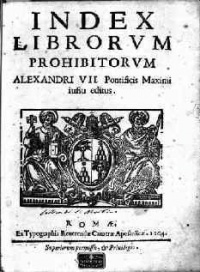Prose
From The Art and Popular Culture Encyclopedia
|
"I'll prose it here, I'll verse it there,
"Just as all fiction first found extensive embodiment in poetry, so is it in poetry that we first encounter the permanent entry of the weird into standard literature. Most of the ancient instances, curiously enough, are in prose; as the werewolf incident in Petronius, the gruesome passage in Apuleius, the brief but celebrated letter of Pliny the Younger to Sura, and the odd compilation On Wonderful Events by the Emperor Hadrian's Greek freedman, Phlegon."--"Supernatural Horror in Literature" (1927) by H. P. Lovecraft |

Illustration: Index Librorum Prohibitorum ("List of Prohibited Books") of the Catholic Church.
|
Related e |
|
Featured: |
Prose is a form of language which applies ordinary grammatical structure and natural flow of speech rather than rhythmic structure (as in traditional poetry). While there are critical debates on the construction of prose, its simplicity and loosely defined structure has led to its adoption for the majority of spoken dialogue, factual discourse as well as topical and fictional writing. It is commonly used, for example, in literature, newspapers, magazines, encyclopedias, broadcasting, film, history, philosophy, law and many other forms of communication.
Structure
Prose benefits the more informal metrical structure of verse that is almost always found in traditional poetry. Poems usually involve a meter and/or rhyme scheme. Prose, instead, comprises full, grammatical sentences, which then constitute paragraphs and overlook aesthetic appeal. Some works of prose do contain traces of metrical structure or versification and a conscious blend of the two literature formats is known as prose poetry. Similarly, any work of verse with more rules and restrictions is known as free verse. Verse is considered to be more systematic or formulaic, whereas prose is the most reflective of ordinary (often conversational) speech. On this point Samuel Taylor Coleridge requested, jokingly, that novice poets should know the "definitions of prose and poetry; that is, prose,—words in their best order; poetry,—the best words in their best order." In Molière's play Le Bourgeois gentilhomme, Monsieur Jourdain asked for something to be written in neither verse nor prose. A philosophy master replied that "there is no other way to express oneself than with prose or verse," for the simple reason being that "everything that is not prose is verse, and everything that is not verse is prose."
Etymology
Used in English since 1330, from Old French prose, the Latin word prōsa (“straightforward”) from the term prōsa ōrātio (“a straightforward speech- i.e. without the ornaments of verse”). The term prōsa (“straightforward”) is a colloquial form of prorsa (“straight forwards”) which is the feminine form of prorsus (“straight forwards”), from Old Latin prōvorsus (“moving straight ahead”), from pro- (“forward”) + turned, form of vertō (“I turn”).
See also


